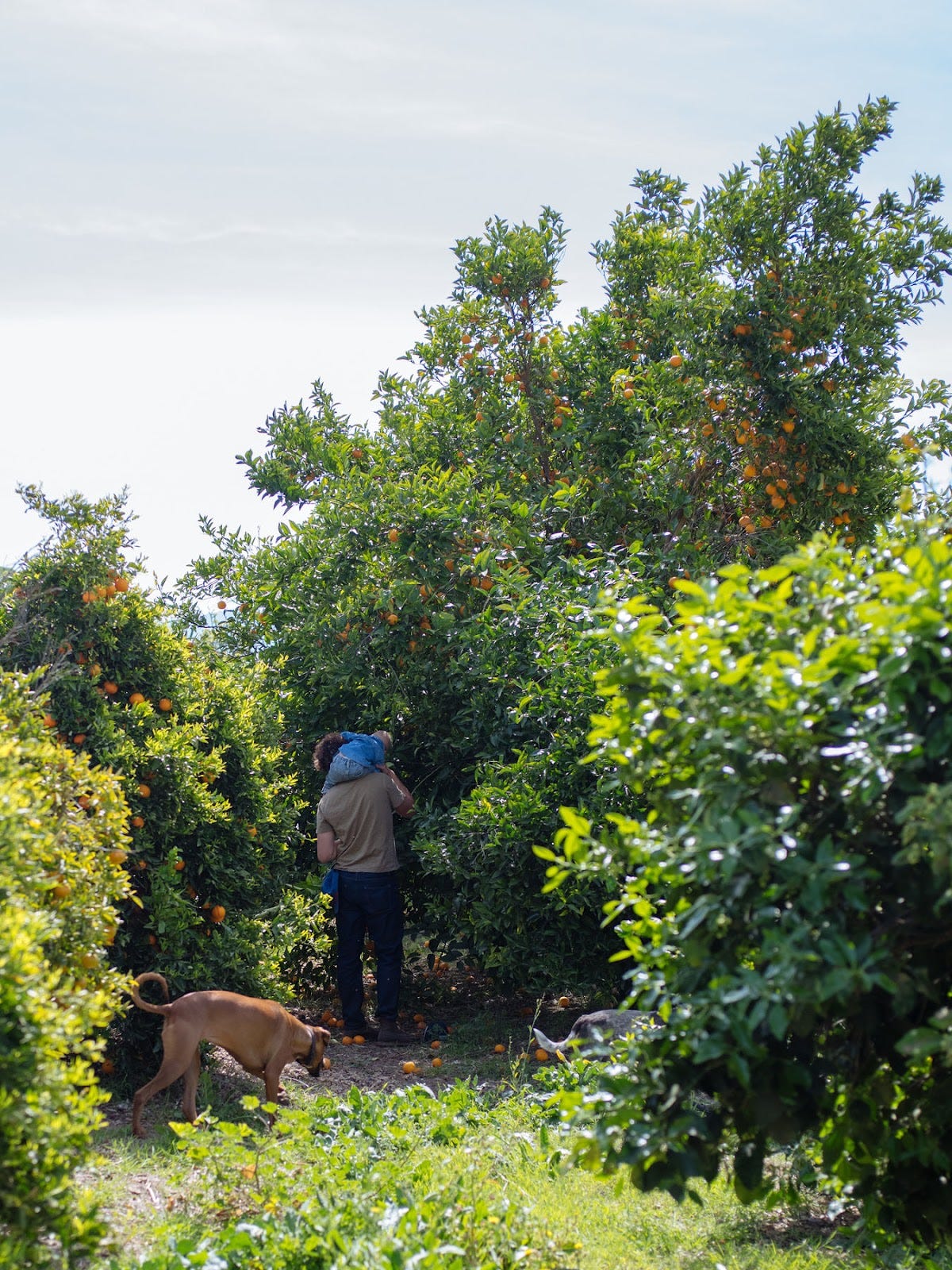Vendor Stories: Mud Creek Ranch
A look into one of the most diverse ecosystems in Ventura County.
Interview with Marguerita Smith By Sam Rogers
Tucked away down a narrow canyon in Santa Paula, Mud Creek Ranch is part family homestead, part farm experiment. What makes Mud Creek unique is the staggering variety of fruits they grow, particularly citrus but also figs, avocados, mulberries, & stone fruit. At last count (they stopped counting) it was almost 400 different specialty varieties. They never oriented the farm towards commercial growing, instead, when they find something they like the taste of at a university or a nursery, they’ll order some trees and see how they do in their microclimate. The Smiths have always planted new trees wherever there were openings that seemed suitable to that type of tree, unlike most farmers who would arrange the trees by variety, in blocks of rows for mechanized care and ease of harvest. The sprawling, uneven planting creates a charming feeling of a backyard orchard, albeit a very large one, or of the mixed agriculture of a century ago. This method has allowed them to create one of the most diverse ecosystems in Ventura County.
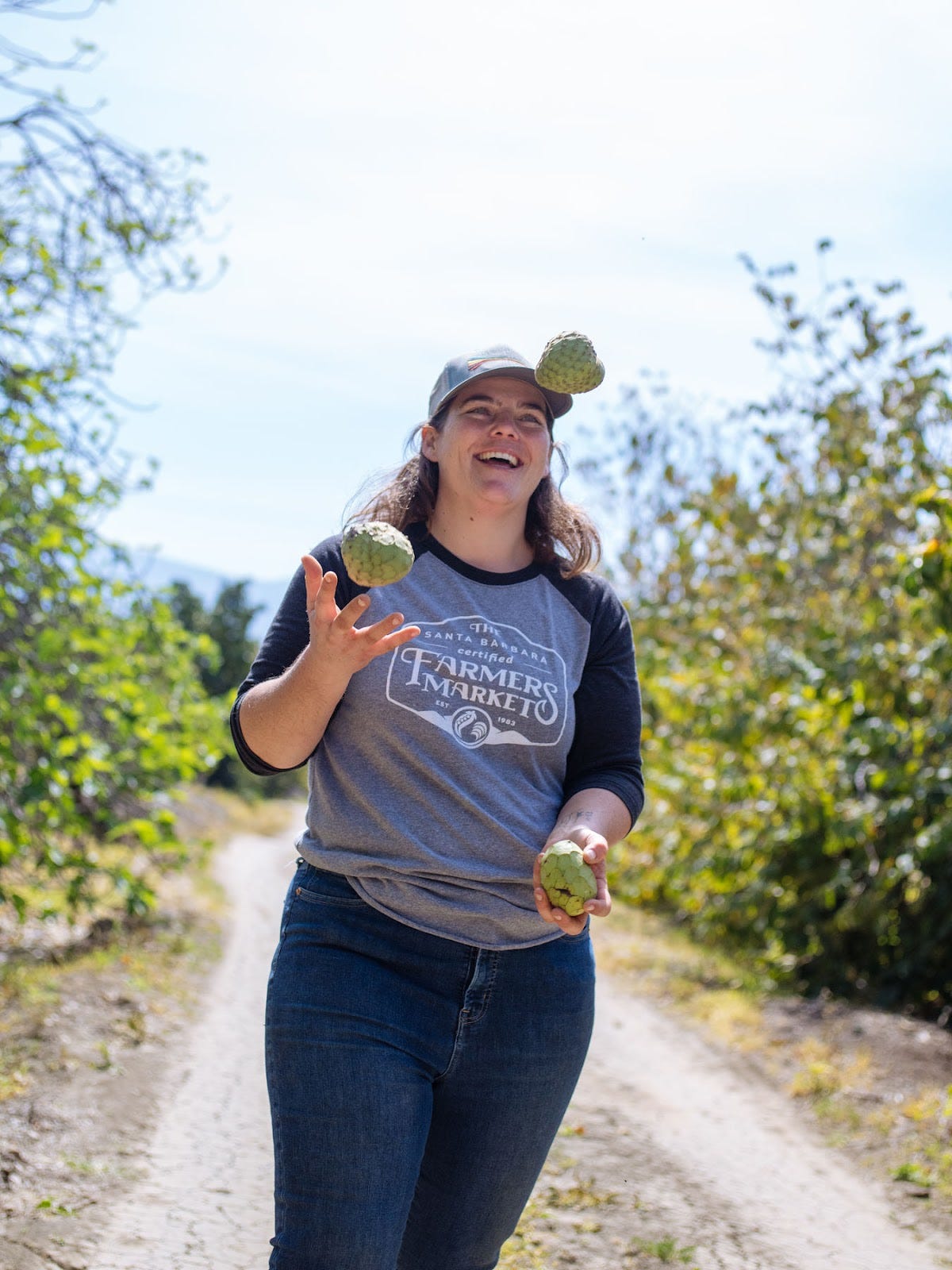
Sam Rogers: Let's start with your family. How did your parents become farmers? What led them down that path?
Marguerita Smith: My mom grew up on a farm in Santa Paula. Actually, she grew up on the farm next to us! My dad's family has always been into agriculture, however, he is the first of his family to go into farming. His family background is in entomology since around 1908 at the University of Nebraska, going back to Lawrence Bruner (SAM NOTE: Check out Lawrence). He was part of the group of scientists that did the research and science that figured out how to fix the dust bowl by introducing grasshoppers back into the ag land. That was kind of the turning point for the agricultural industry to realize the importance of bugs and agriculture. So that's kind of cool.
So is Lawrence Bruner your family?
Yes, he is my great great grandfather. And then Harry Scott Smith who helped to start the entomology department at UC riverside is my great grandfather.
So you're agriculture royalty??
Right! My parents met in their 20’s. They went on a date, and one year later my mom asked my dad to marry her. In 1985 they bought the farm. They were both doing other agriculture stuff, mom was helping her family’s farm and she was a librarian on the side, and my dad was working for Sunkist. He always worked for big companies like that. Back then Mud Creek Ranch was just a very simple farm of oranges, lemons and avocados. In 1990 there was a huge freeze (SAM NOTE: You may remember we also talked about this freeze when chatting with Romeo Coleman) that impacted the land and the trees. It completely switched their mindsets leading them to be more self-sufficient and grow everything that they ate. At this time Mud Creek really started branching (fruit tree pun) out and dove into planting the diversity of varieties that we grow today. They then decided they wanted to shift the farm and become Certified Organic.
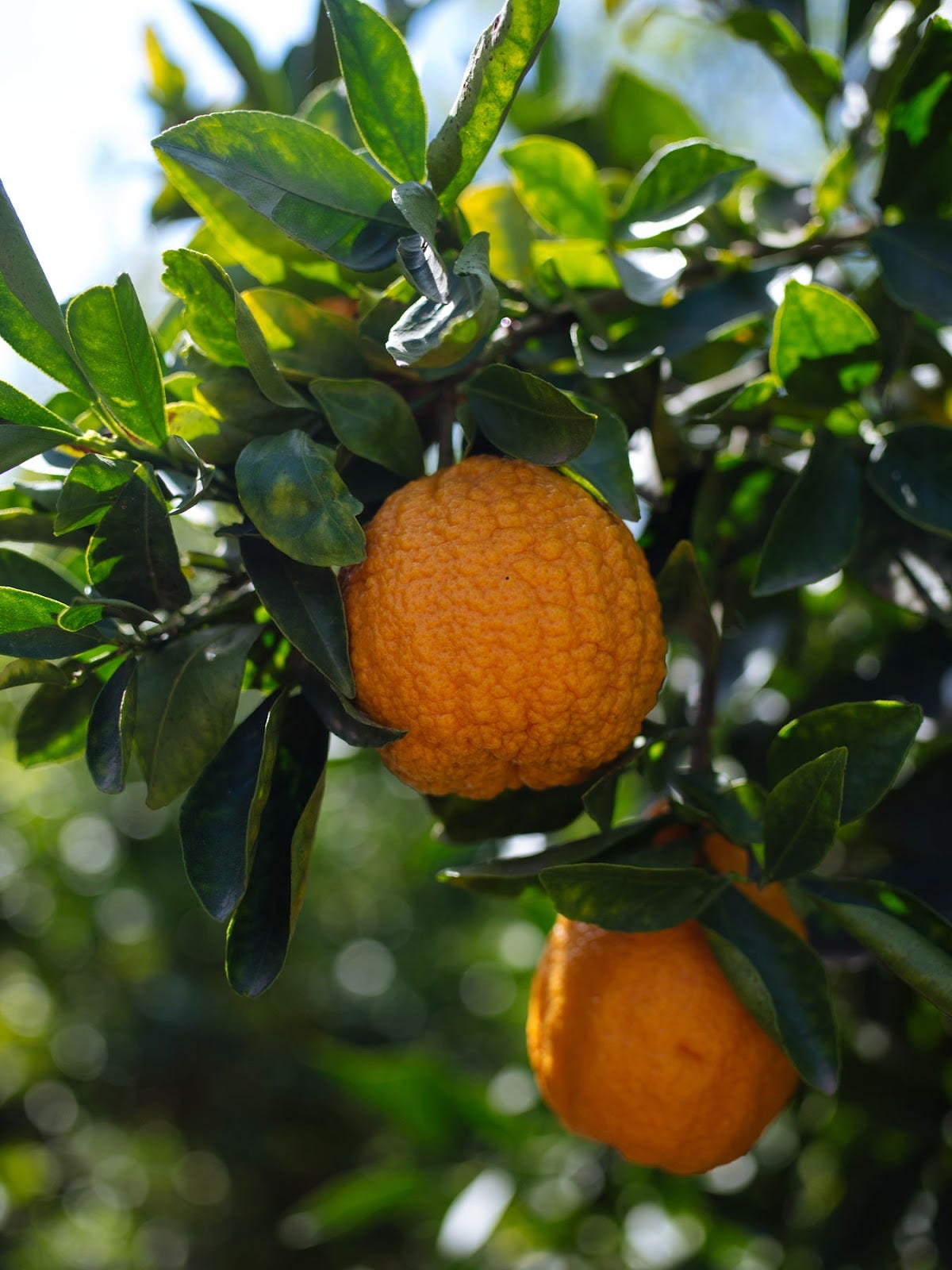
So you and your siblings grew up both harvesting and working the markets?
For the most part. I would say out of all the kids I was the one that definitely went to the farmers markets the most.
Was that because you were young and the one they were going to tote around, or was that because you were the most interested?
It was both for sure. When I was younger it was definitely more like, can’t afford a babysitter so you just can come to work with me today. But I had so much fun and loved getting to meet new people and building relationships.
And those are relationships, especially since you started so young and it's a lot of the same people around, these people have really seen you grow up.
Yeah! They have been with me as I have grown up, they have been a part of the other stuff I have been doing in life, life my culinary career and bartending and it’s just really cool to have people be a part of my life that I see maybe once a week but know will always be in my life no matter where they go or I go, and that's a beautiful thing.
I want to talk more about all the varieties on the property and how your parents chose them.
I think the main reason why we grow so much is because my dad was so intrigued. You do all this research on a particular citrus or tree fruit and I guess he just figured, “well I have 60 acres, if I like it, I’ll plant more.” So it was that curiosity with just all the different available citruses in the world that was the basis of how Mud Creek was really started. That is why we now grow something like 25 different varieties of tangerines, 15 different varieties of oranges, 20 different varieties of avocados, and then all the specialty citrus like etrog, and ponderosa lemons and….
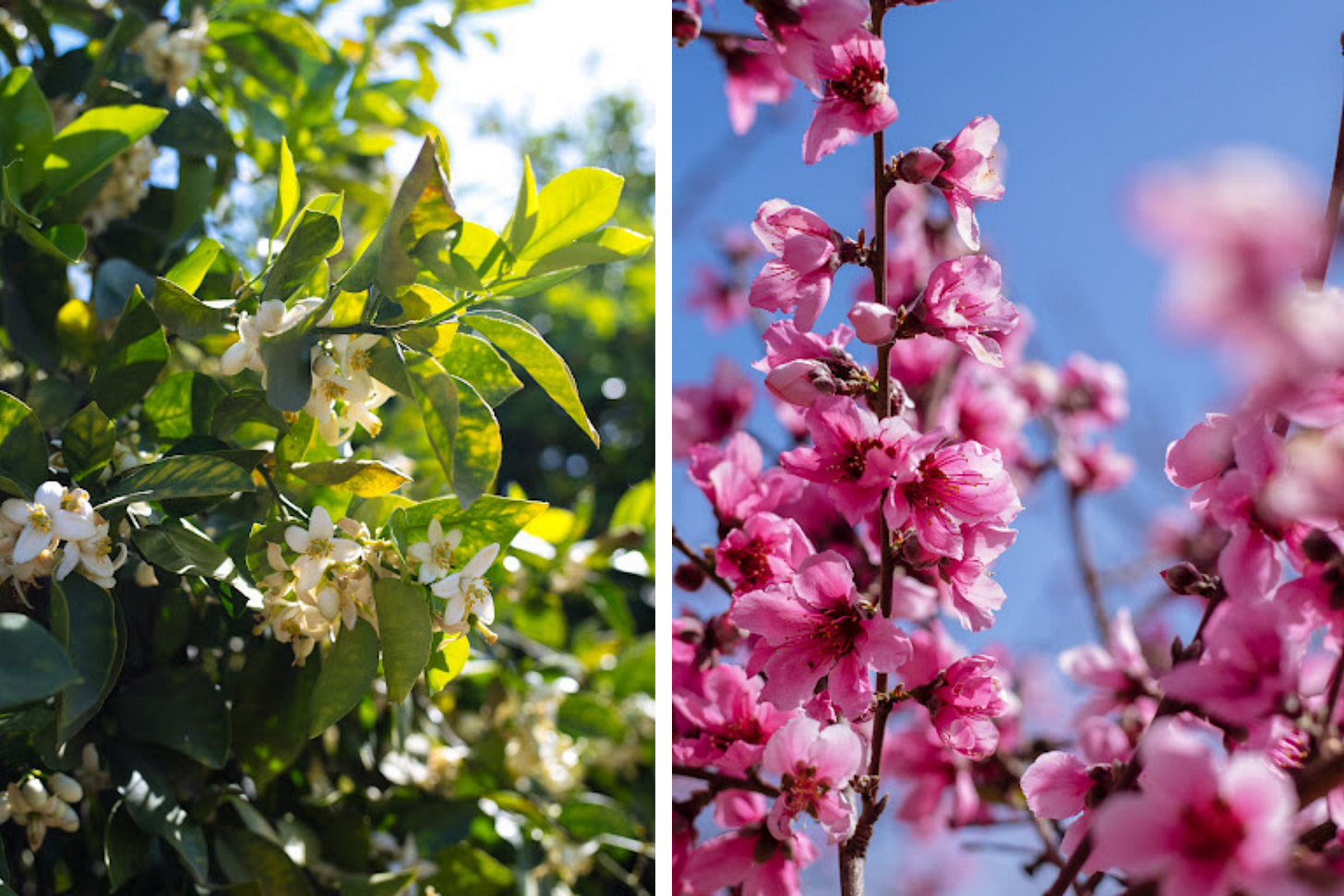
It's like a dream, how do you keep it all in order?
Nothing is systematic, I almost remember where every single tree is but still I have to remind myself all the time. So if I’m walking through the orchard, I'll see a random sudachi lime, just all by itself. Then next to it will be a Persian mulberry tree and then there will be a line of 20 apricot trees and then a Palestine sweet lime and then there will be Hass avocado. It's not normal, like when you're driving through agricultural land and orchards are all the same tree at all the same height. The rows are different sizes here, it's really cool, it's like the Disneyland of orchards.
Can you tell me about the micro climates in Santa Paula and why it's so good for all these varieties?
It’s all about the way the valley is, and the way the heat flows and the heat distribution, like the way that the air sits, and the different soils that are there. Some soils are more rock heavy, while others are more clay heavy. This creates these little niches. You can grow cherries and things that need a lot of chill hours in one spot and then you can have the avocados 2 acres over where they get more heat and humidity and more of the tropical feel, and it's all within 60 acres. It's like when a house gets cold. Some places have better insulation (air flow) and some spots just stay super cold during the winter and in the summer is the hottest place in the house. Mud Creek is in this little niche where those kinds of temperature fluctuations happen in different pockets on the ranch because of how the air sits in different areas throughout the farm.
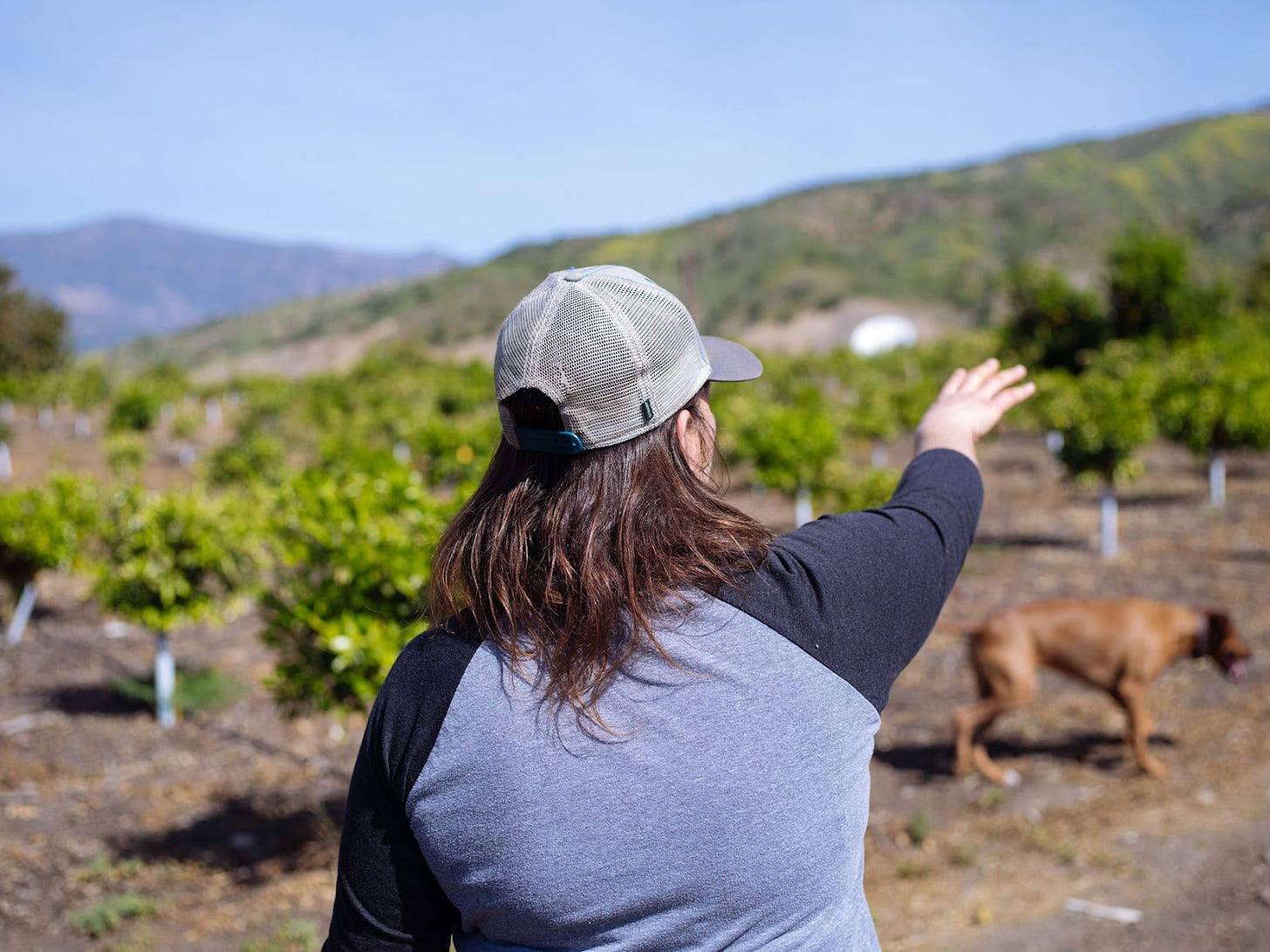
It's the micros within the micro climates! Tell me about your water situation.
Our water is a little bit different. So in Santa Paula it is a co-op, it is the Santa Paula Canyon Irrigation and we actually scored, which is one of the reasons Mud Creek is such a unique place. We have a grandfathered water right, so we can actually pump from the creek. We still have to pay for it through the city, but the water access will always be there, we are never going to run out of it, it will never be an issue, it is an incredible situation. These type of systems just don't exist anymore, I think there are only like 5 in Ventura County.
Is there anything interesting about the way you feed your trees?
We do a lot of mulch for weed control and we take all the supplements and minerals and inoculate it into the irrigation so then when we run the irrigation lines all the nutrients are going into the water and actually penetrate the spoil deep down. Oh! And BUGS! We get ladybugs here and there. We actually bring in lady bugs and contract beekeepers to spread their hives out for about 2 weeks and that helps with the pollination and all that.
To us this really emphasizes the importance of organic farming. I know we aren't biodynamic or any of that, but a type of regenerative agriculture is so important for any piece of property. It's like a totem pole, and at the top of the totem pole is how you get to pick and eat the fruit, but at the bottom of the totem pole, is how you get there and how you get that fruit to the table, and having that strong structure of really taking care of the land rather than just farming is so important.
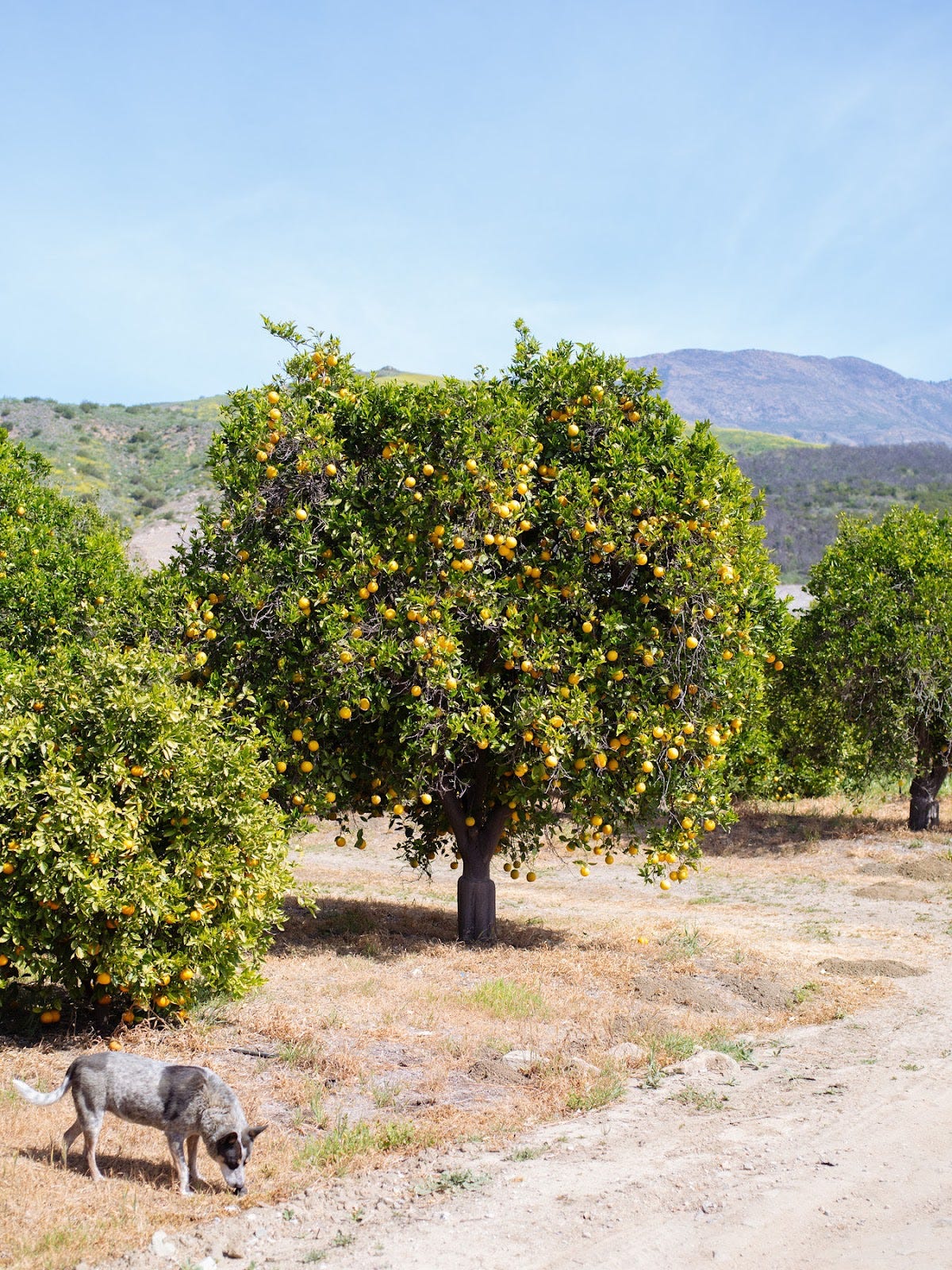
Tell me about growing up in the Disneyland of citrus, being a kid raised with this as your backyard?
It's so neat, growing up like that really brings you to that concept of being close with nature and that foundation, but also the imagination of building tree forts in avocado trees in this cool Peter Pan adventure land. The sense of imagination it can create for a child, I know that I lucked out on this. It has helped me so much with food and cooking, but really just the imagination and the different artistic levels of things, the pure joy and excitement – and I still get to feel that as an adult.
Talk to me about cooking and mixology and your passions there.
Part of it was growing up as a farmers market kid and meeting all these great chefs and the excitement about produce. I just really fell in love with it and the passion of it, and then being around the produce all the time I was really able to create a flavor profile. I went to culinary school and it made me realize, this is what I'm meant to do. I worked in restaurants for a couple of years then got into catering and really found a passion there. I worked for catering companies for a couple of years then started my own company when I was 21 and just doing a farm to table catering style of using whole animals and not having any waste. I did that for a while, and then The Good Lion cocktail bar opened up in Santa Barbara. Brandon, the owner, had heard me on one of the NPR Good Food segments about making limoncello and citrus infusions. He was already buying lemons from us, so the next week he asked if I wanted to come join his team and make the infusions for his cocktail bar. It is a farm to bar, using local ingredients and making syrups and cordials and playing around with favors. We made a lot of fun stuff at that bar. It was really cool that Brandon let me run the creativity realm for the prep of the bar. I worked there for about 5 years.
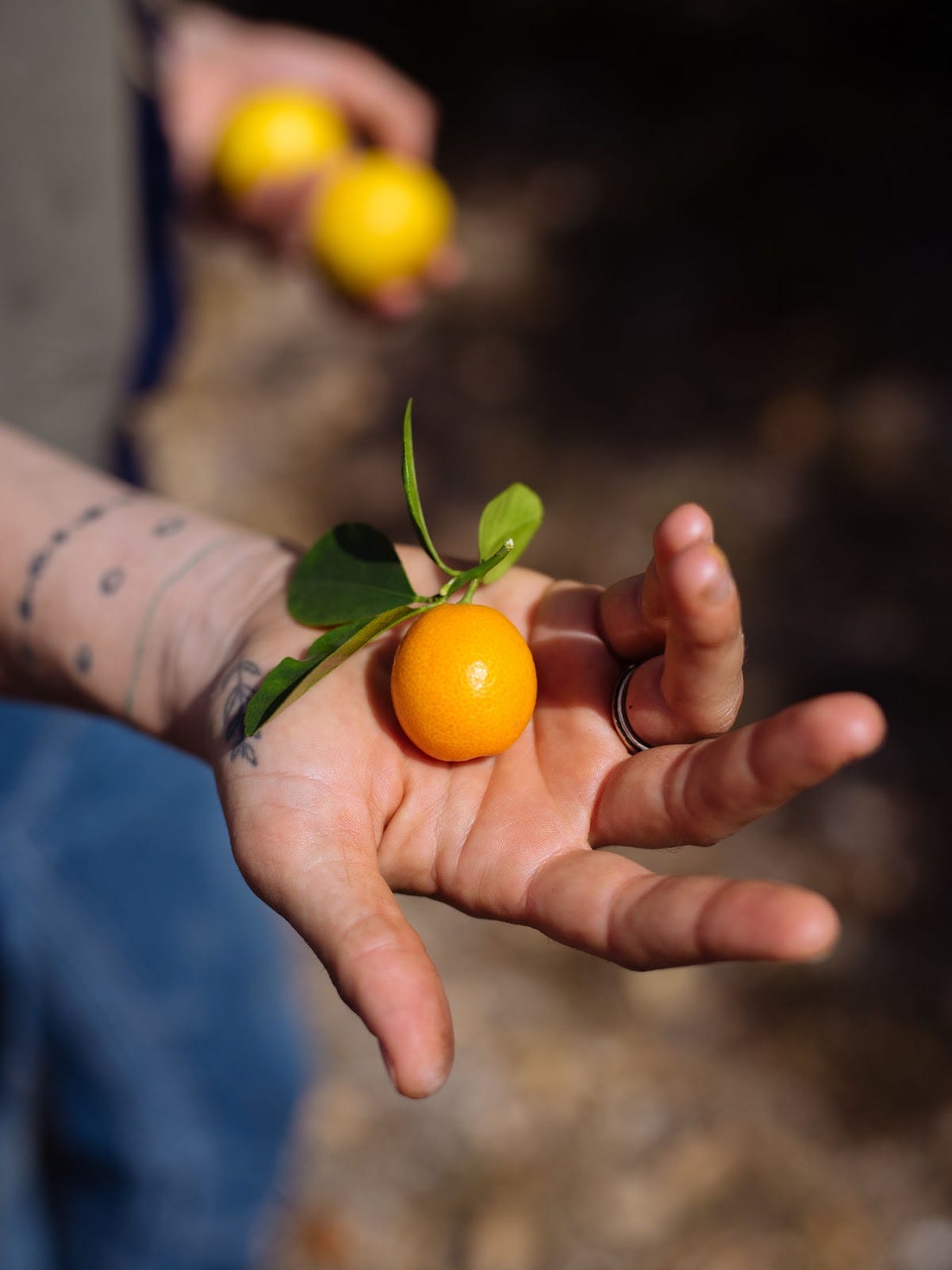
After pursuing your own path and then returning full time to the farm, you've really become the face of Mud Creek. I feel you're really taking Mud Creek down a new path, which is so beautiful. What did you feel like you were able to bring back as a younger person to the family business?
Through all my side adventures I've always been a part of it via farmers markets. I think it is being younger and understanding what my generation wants and believes is important. Also, having the restaurant experience. I know what chefs need and how chefs work, and how restaurants work, and how to find a good balance to provide for the restaurants in an efficient manner for Mud Creek. I think that will make it a productive and lucrative farm.
I just find that in the last couple of years Mud Creek has expanded up so much, and maybe it's just me and what I'm looking for has changed, but I just feel like that structure has changed… I just think you're doing a really great job.
Well, thanks! My parents wanted to have a farm and they are so passionate about it, but they are passionate about it in different ways. I am passionate about growing trees and having land, but something that I really care about in general is having good relationships with people and having good customer service relationships. I think that has helped the farm a lot. I'm able to send out farm updates or respond to an email and I'll tell people if I'm going to or not going to have a product. And the general sense of community that it builds just through the relationships.
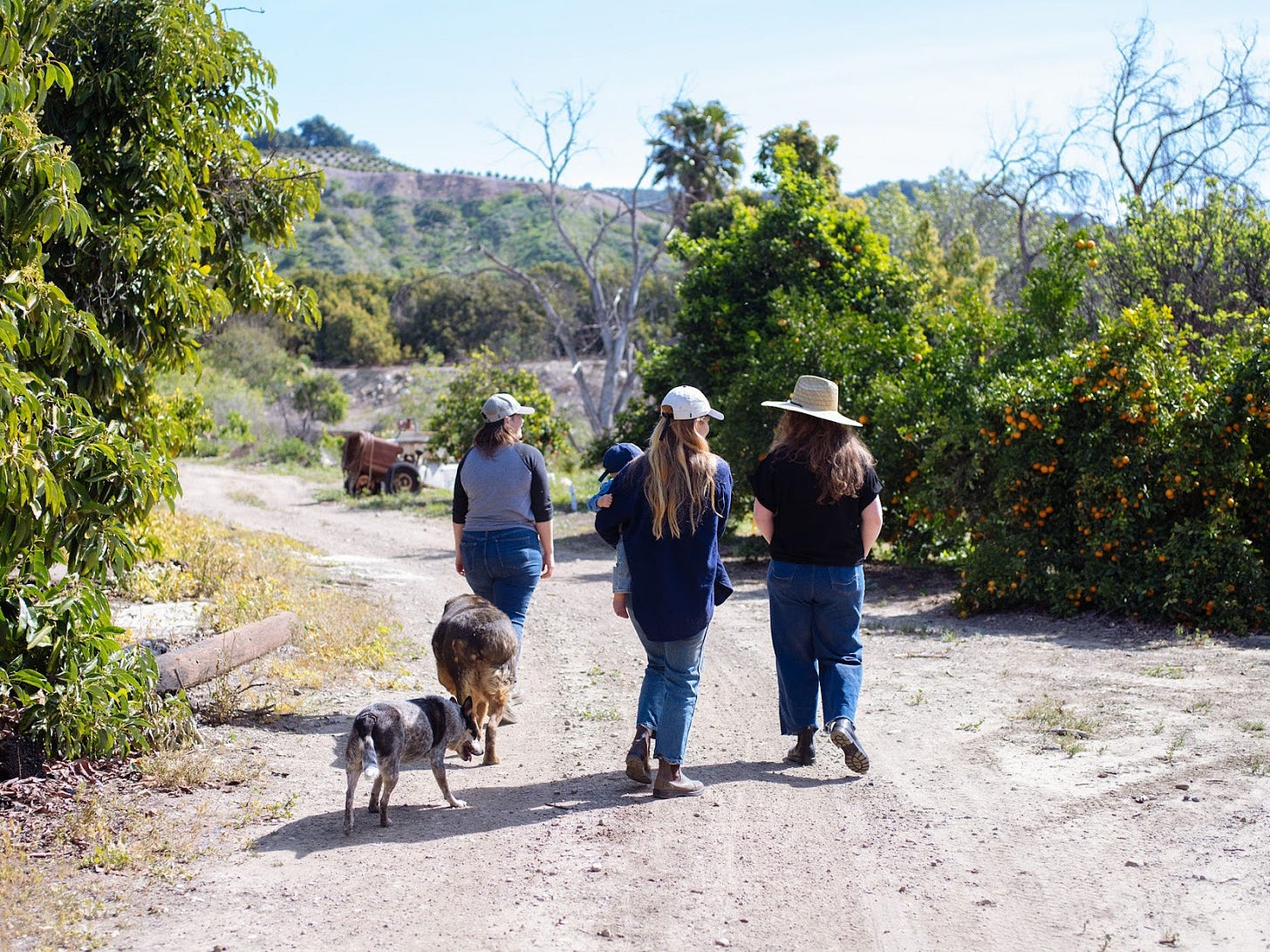
As sad as it is to say, there are so few female farmers, being a female, what do you feel is different for you? How do you think it changes your perspective on business, community?
Well, there’s being a female farmer and the publicity side of it. It definitely gets people excited, and it is a very good way of marketing. However, when it comes to the business side, I will meet a man in agriculture who is 35 and we talk about different farm practices and ethics, and they don’t take me seriously — that sexism still exists. How is this chick going to be a better farmer than me, and she’s GAY!!!
OH MY GOODNESS! IT'S A DOUBLE WHAMMY!!!
Hahaha yes, but there is that sexism that exists in the agriculture world just like any other profession, but honestly I thrive off of it. If someone is going to come to me and do that whole, “here's my ego” thing, I shut it down and I just kick ass and I run with what I can. I mean look at Mud Creek and how popular we have gotten, and now we are shipping fruit to New York City and Alabama. Plus being a lesbian farmer who knows how to cook... why would anyone hate that??
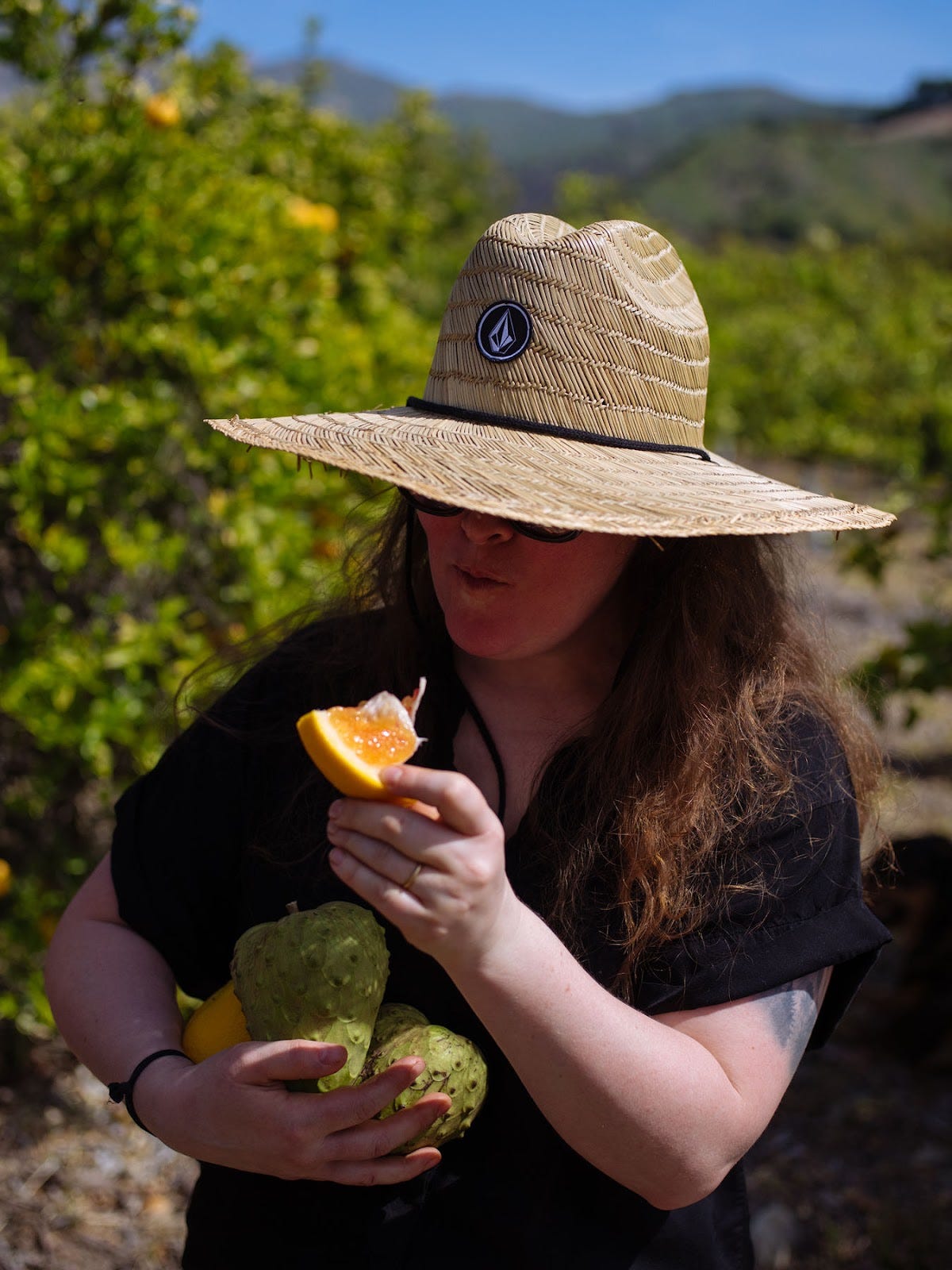
If you feel comfortable, would you talk about how the recent fires affected the land and your family?
My siblings and I have taken over the farm with my parents retiring. After the Thomas Fires, I think it was really hard for a long time for both my parents to wake up every single day and be reminded of what they lost. And I'm not talking about the Orchard side of things. My dad had original copies of research books that Harry Scott helped write in his prime time. Mom lost a Grand Piano that was given to her and has been a part of her family for generations. I could never replace my great grandfather's work documents, but thought I could get a rad grand piano to help mend some hurt with my parents… but never bought one because it would never bring my mom the satisfaction she once had. Knowing that and seeing your parents’ hearts broken is so much harder than being the kid that has their heart broken. Mainly because there is that parental wall of, “I'm supposed to help you when you're broke, but I'm your parent and can fix myself.”
So Steve and Robin are on their new adventure and loving it. Between my brother and sister, we are still figuring out the balance of things with the farm being able to run without mom and dad. But currently it's just me and another worker picking all the fruit for all the markets and restaurants/ wholesale orders. Which, side note, I've been able to do it like this for a year and still have a smile on my face
As someone who is on the ground being a young farmer, how do you see the future of farming looking? What is your perspective on this?
After Covid, I think people are beginning to be a lot more mindful about the importance of where their food comes from. I know there is a huge movement of small family farms, or small independent farms instead of huge corporations that own 2,000 acres etc., and I can see that movement happening. I think that will continue to happen if enough people, especially my age, start to become more aware and passionate about what is better for the earth. I feel a strong interest in the homesteader lifestyle and possibility that more people are going to try to become self-sufficient.
